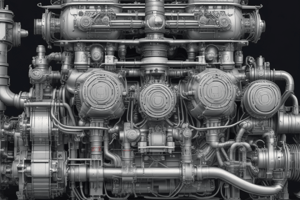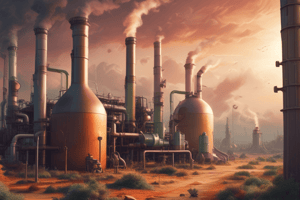Podcast
Questions and Answers
What is the chemical process in which a substance reacts with oxygen to give off heat?
What is the chemical process in which a substance reacts with oxygen to give off heat?
- Decomposition
- Evaporation
- Combustion (correct)
- Oxidation
What are some fuels commonly used in homes?
What are some fuels commonly used in homes?
- Charcoal, methane, and butane
- Wood, coal, and cow dung (correct)
- Kerosene, natural gas, and gasoline
- Propane, diesel, and ethanol
What is the main difference between the burning of a candle and the burning of coal?
What is the main difference between the burning of a candle and the burning of coal?
- Candle produces heat, coal produces light
- Candle burns with a flame, coal does not (correct)
- Candle burns without a flame, coal burns with a flame
- Candle produces carbon dioxide, coal does not
What gas is produced when coal burns in air?
What gas is produced when coal burns in air?
What is the product of the combustion of magnesium?
What is the product of the combustion of magnesium?
Flashcards are hidden until you start studying
Study Notes
Combustion Process
- Combustion is the chemical process in which a substance reacts with oxygen to give off heat.
Fuels Used in Homes
- Some common fuels used in homes include coal, wood, and gas.
Burning of Candle vs Coal
- The main difference between the burning of a candle and the burning of coal is the speed and purity of the combustion reaction.
Product of Coal Combustion
- When coal burns in air, it produces carbon dioxide gas.
Product of Magnesium Combustion
- The combustion of magnesium produces a bright white light and a large amount of heat, producing magnesium oxide as a product.
Studying That Suits You
Use AI to generate personalized quizzes and flashcards to suit your learning preferences.





